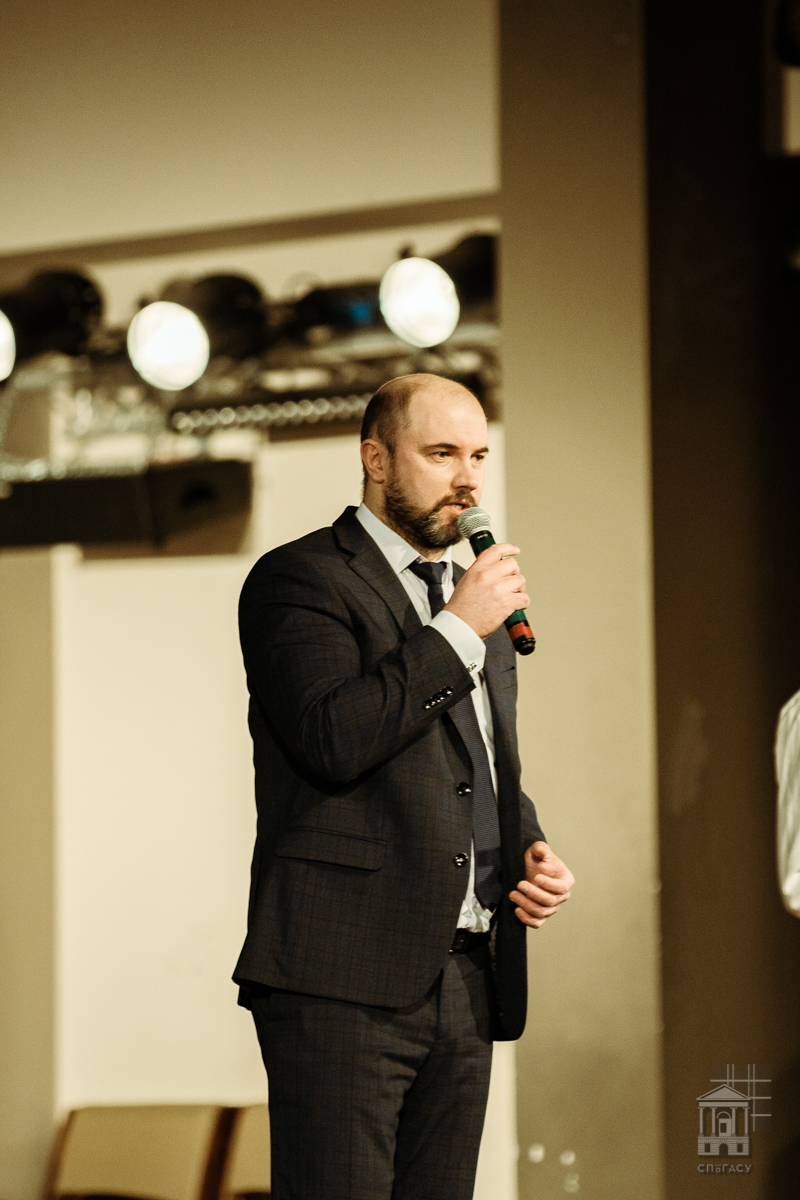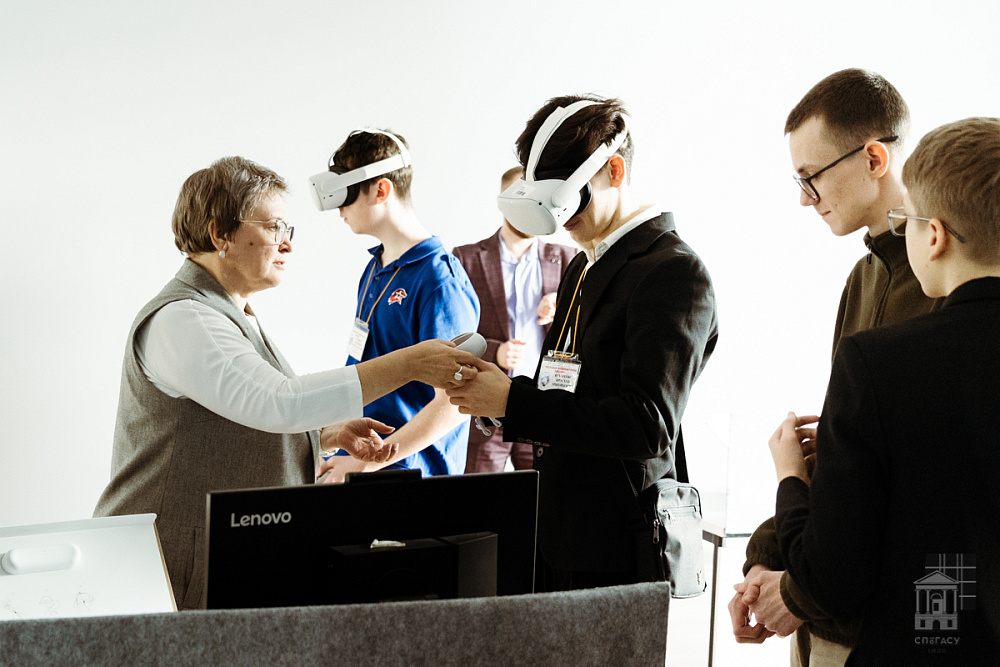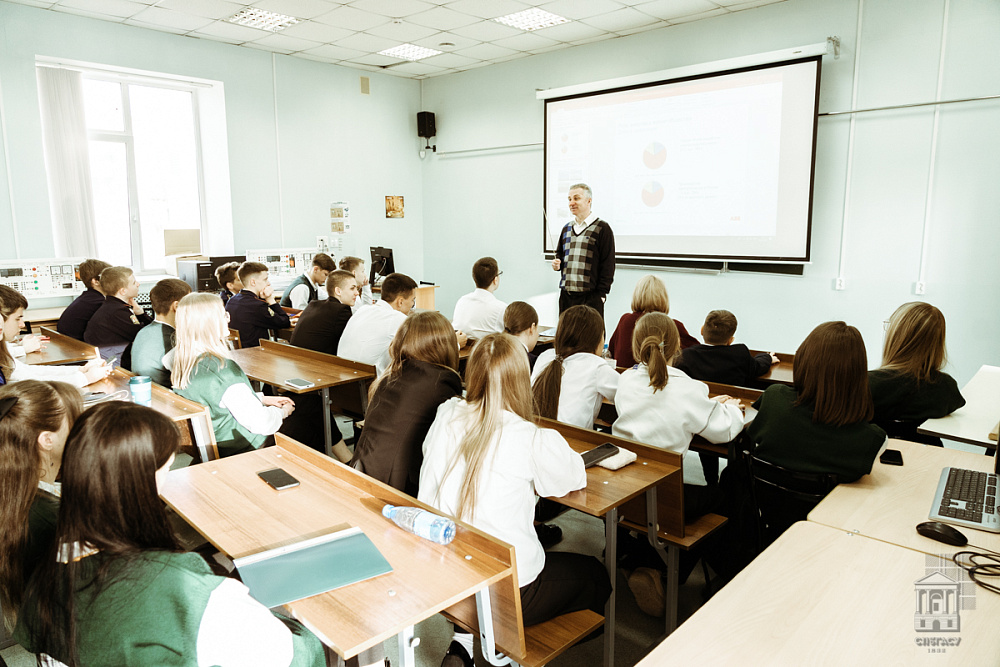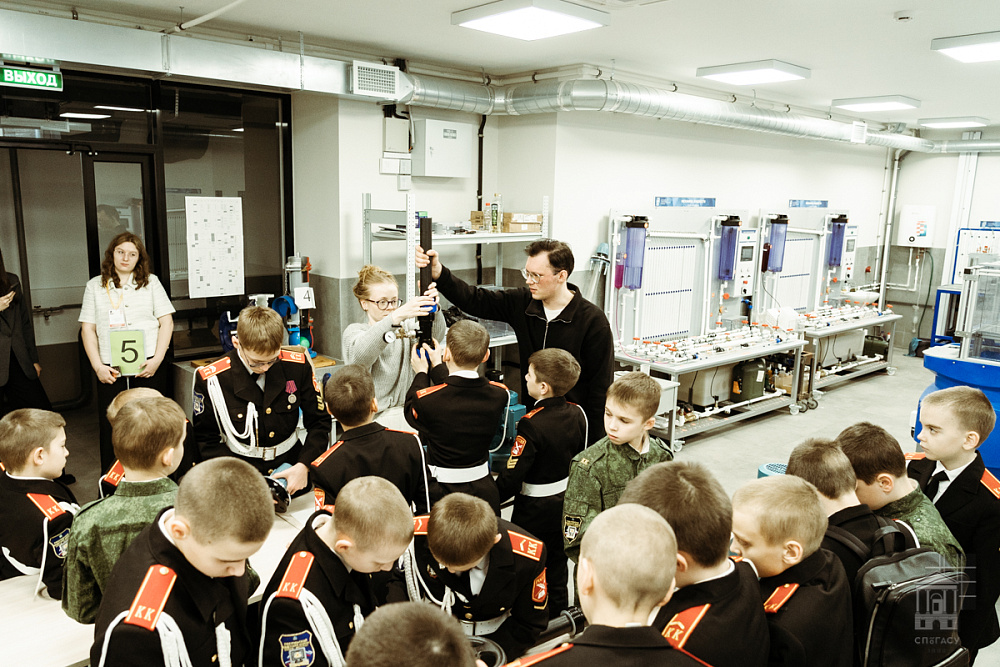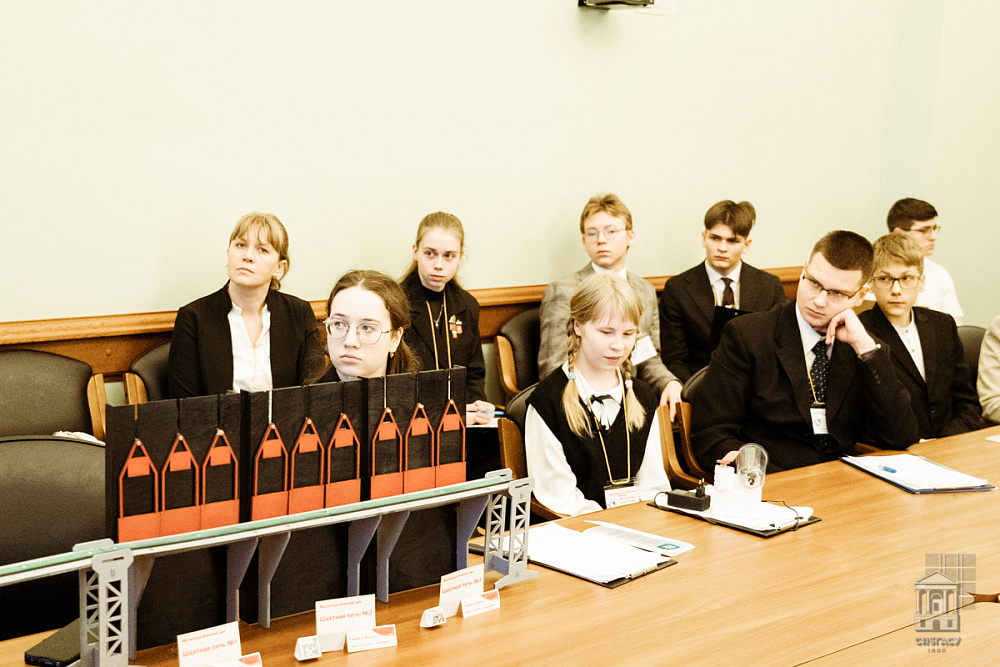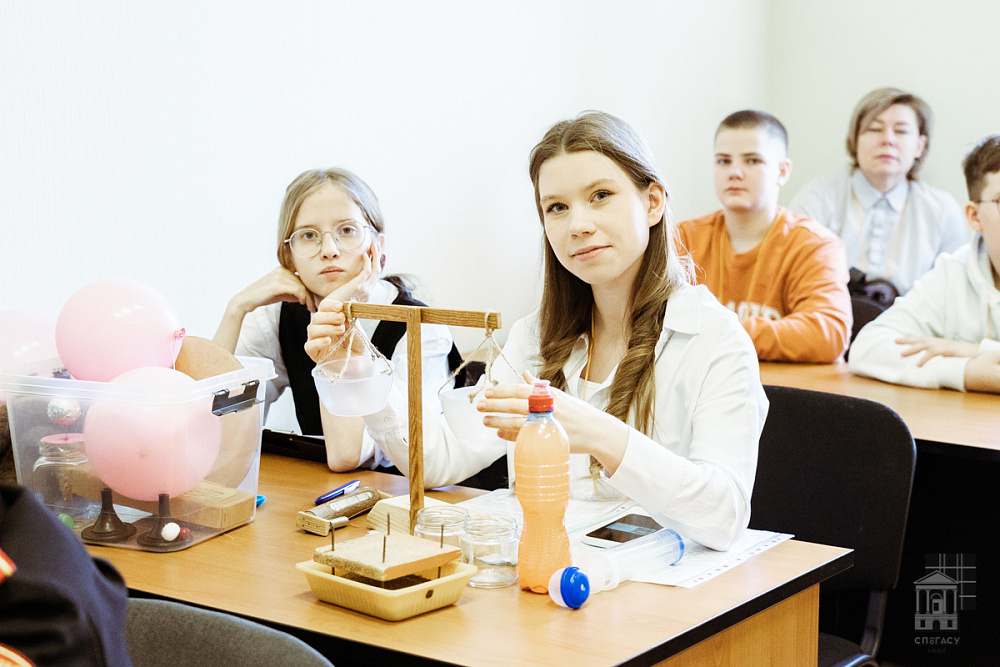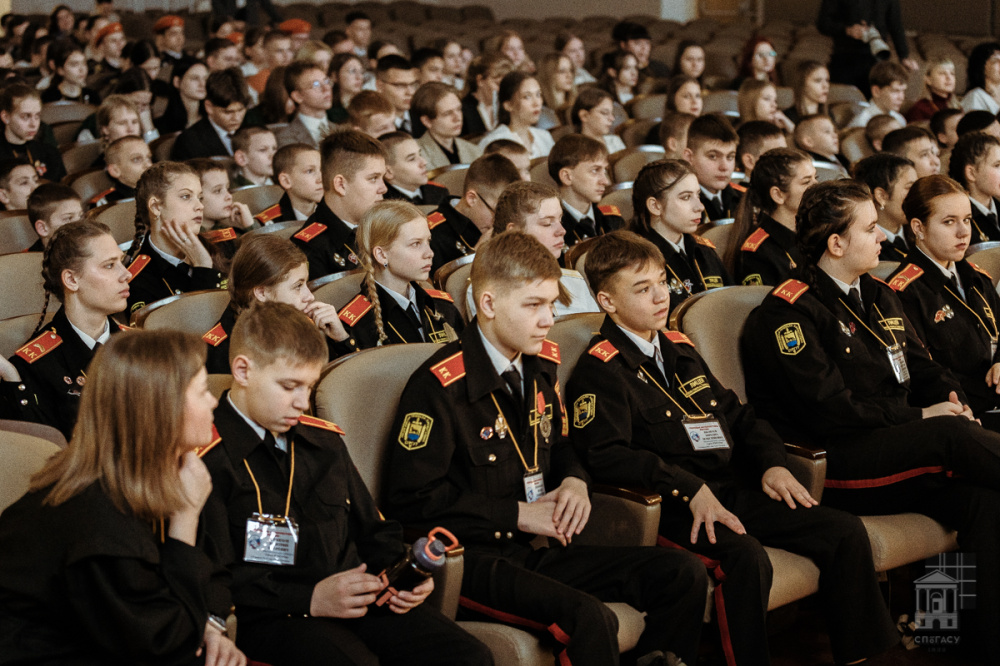 Festive opening of Science Day
Festive opening of Science Day
SPbGASU held Science Day for participants of the 17th All-Russian Youth Educational Forum "Young Intellectuals of Russia". On 5 February, 5–11-grade pupils of educational institutions defended projects and papers, attended master classes, and got acquainted with our university.
The forum dedicated to the Day of Russian Science is being held in Saint Petersburg from 4 to 8 February. Its organizers are the Interregional Multidisciplinary Center "St Petersburg Education", the St Petersburg Interregional Center "Education without Borders", higher education institutions of the Northern capital with the support of the Academy of Military Sciences, the Maritime Council under the Government of St Petersburg, the Council of Municipalities of St Petersburg. As Natalya Polupanova, Director of the Interregional Multidisciplinary Center "St Petersburg Education", said, "198 participants from 15 educational institutions of 10 cities in 6 regions of the Russian Federation arrived at the forum. This year, the number of projects - 142 - is unprecedented. Project defenses are traditionally held at SPbGASU."
The events at our university were organized by the Admissions Committee with the participation of the Volunteer Club, the Kirpich Student Creativity Center, the Student Media Center and teachers.
On behalf of Evgeny Rybnov, the SPbGASU Rector, Dmitry Ulrikh, the Dean of the Faculty of Environmental Engineering and Municipal Services, greeted the young intellectuals. Dmitry Vladimirovich said that our university has been the talent pool for the construction industry since 1832. Each faculty has its own scientific schools. The university is waiting for the guys as students.
The forum participants learned about the activities of student associations at our university and watched performances prepared by the teams of the "Kirpich" Student Creativity Club.
«Get your message across to others»
After the official part, the guests went to the university lecture halls to defend their projects. The defenses took place within the humanitarian, natural science, historical, technical, creative and philological sections. In each section, the projects were evaluated by a jury.
The meeting of the technical section was opened by Andrey Zazykin, Dean of the Faculty of Automobile and Road Building. Andrey Vyacheslavovich believes that the faculty he heads, which trains specialists in the field of transport and mechanical engineering, is the most technical. Transport logistics, intelligent transport systems, modeling of road traffic and interchanges, construction of roads and bridges, organization of road safety, traffic light regulation, road signs, design and operation of vehicles - all this is done at the FARB. Here they train not only specialists, but also those who know how to get their messages to others, present research results, and manage a team. The Dean wished the guys not to deviate from their path and invited them to take part in the Olympiad "Transport Systems and Technologies", for successful performance in which additional points are awarded to the Unified State Exam. An application can be submitted until 10 February.
In the project "Computer modeling of the movement of material points", Ekaterina Antipina, a 9th-grade pupil at Secondary School No. 3 in Kirovograd, Sverdlovsk Oblast, examined the movement of material points in various conditions, including the influence of forces, interactions, and the environment on their trajectory. The author worked in the Blender program, which allows demonstrating physical processes in a visual form. According to Ekaterina, her project helps develop an interest in physics and deepen knowledge of the subject. "I can say with confidence that the use of computer modeling has become a powerful tool for visualizing physical concepts. This project showed how modern technologies can be used in the educational sphere," Ekaterina said.
The features of windy spaces between architectural objects were studied by Anton Goloshumov, a 10th-grade cadet at the Lyceum named after Major General V. I. Khismatulin (Surgut, Khanty-Mansiysk Okrug (Yugra)). Under the scientific supervision of Sergey Osipov, a physical education teacher, Anton created a model reflecting the location of houses on one of Surgut streets, and conducted an experiment to study the nature of the wind between them. The young researcher believes that in places where there is strong wind, it is advisable to plant trees or shrubs. And it is also not appropriate to put playgrounds and billboards there.
After defending their projects, the forum participants took a tour of the university and attended master classes.
From quadcopter to thermal imager
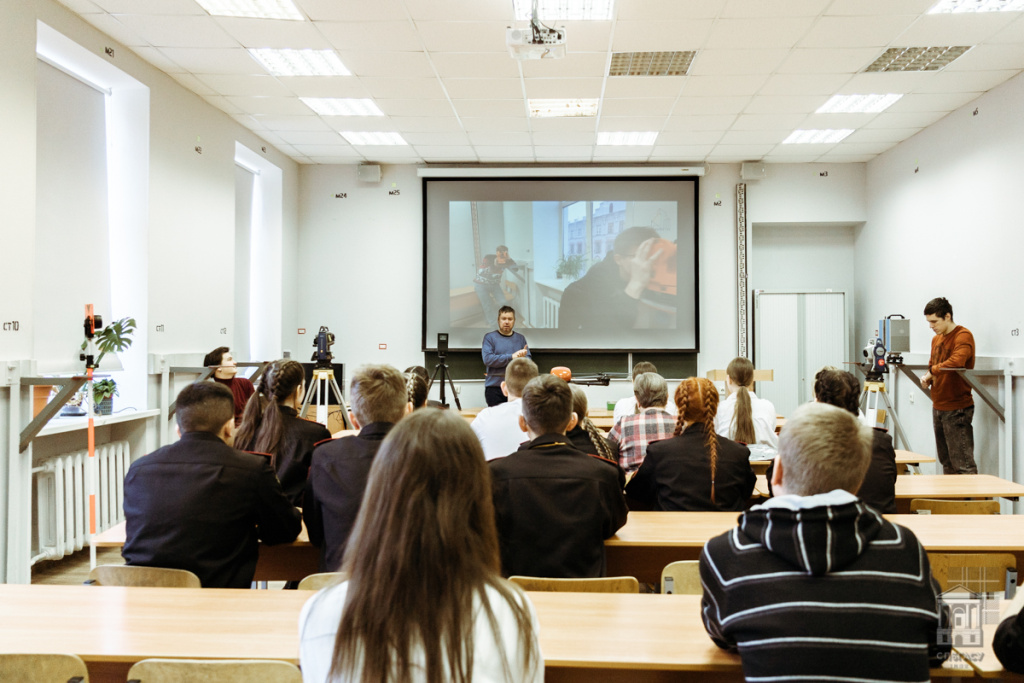 Master class "Geodetic instruments"
Master class "Geodetic instruments" The master class "Geodetic instruments" was held by Dmitry Dietrikh, Deputy Secretary in Charge of the Admissions Committee for Work at the Faculty of Environmental Engineering and Municipal Services, Senior Lecturer at the Department of Geodesy, Land Management and Cadastres. The pupils learned that graduates of the department can become specialists of Rosreestr, surveyors or cadastral engineers, and also work in related specialties - after all, all construction companies welcome a diploma from SPbGASU. They also learned about the purpose of geodetic instruments: a quadcopter, a 3D scanner, a theodolite, a reflector. Under the guidance of the students, pupils could try these instruments in action. And in the process of communication, ask the students any question about studying at SPbGASU.
The hydraulics laboratory held a master class on "The structure and operation of pumping stations. Assembly of pressure pipelines." Ksenia Dmitrieva, Assistant at the Department of Water Use and Ecology, and Maksim Sankov, Senior Laboratory Assistant at the Department, also began the lesson with a story about what graduates do: they design, build, and reconstruct water supply and sewerage networks. Then they talked about the types of pipelines and connections. As a result, the guys independently assembled a pressure section of a water supply pipeline.
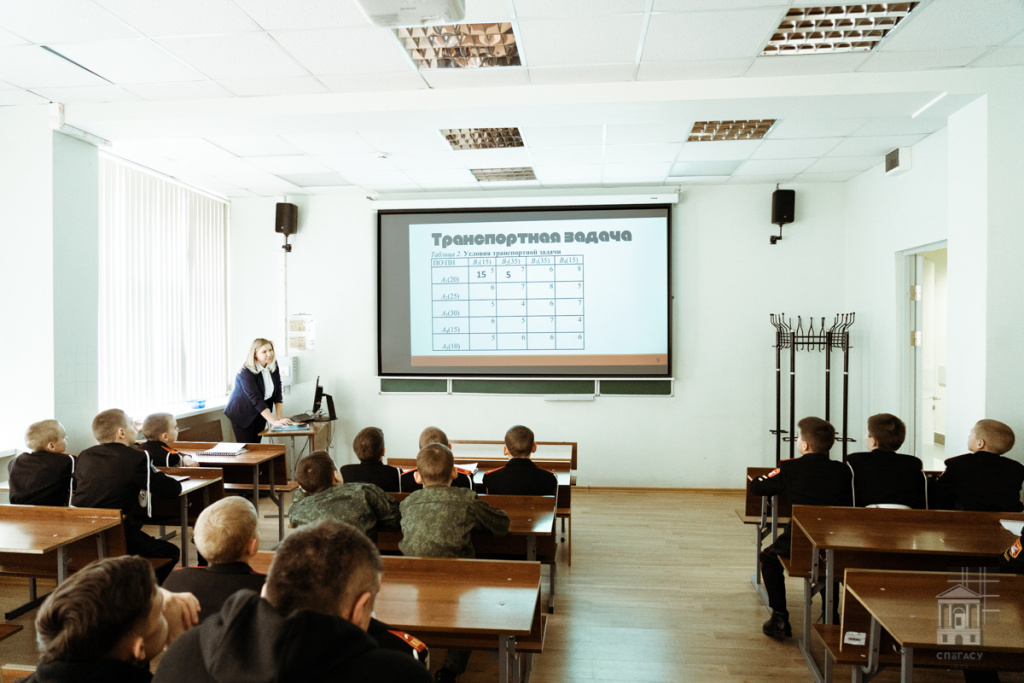 Master class "Operations research models"
Master class "Operations research models"
At the "Operations research models" master class, they learned to apply mathematical models to solve practical problems. For example, how to transport goods from warehouses to stores, construction sites, or other places; how teams can rationally design objects. Lyudmila Moskalenko, Associate Professor at the Department of Information Systems and Technologies, suggested trying different solutions: calculating manually, writing a program, or using tools that are available on every computer.
Associate Professor at the Department of Structural Physics, Power Engineering and Electrical Engineering Aleksandr Epishkin spoke about what is happening at his Department, as well as about the purpose, selection and operation of electric drives in the public utilities of urban facilities at the master class "Purpose, selection and operation of electric drives in the public utilities of urban facilities".
Kirill Sukhanov and Ekaterina Anshukova, Associate Professors at the Department of Heat and Gas Supply and Ventilation, held a master class "Buildings engineering systems. TIM modeling and VR technologies". Participants of the master class learned about the fields of study in the department, got the opportunity to work a little in software packages in which heating and ventilation systems are designed, and visualize the obtained result using virtual reality glasses. They also studied a thermal imager and a heating device.
Participants' feedback
Alena Fadeeva, a 10th-grader at Secondary School No. 24 in Krymsk, Krasnodar Krai, enjoyed defending her project the most: "I enjoyed performing the most. I defended the "Molecular cuisine" project in the natural science section for 10th-11th graders. The jury members were friendly and asked interesting questions. And I really like the appearance of the university."
Irina Koroleva, a biology teacher at Secondary School No. 2 in Solnechnogorsk, Moscow Region, attended such a large-scale event for the first time: "The children are captivated! As a teacher, I like that they can immerse themselves in their future profession and see how the equipment works. For children, this is practice that they will remember for the rest of their lives. Their parents are also very pleased that the children were able to visit such a wonderful place."






